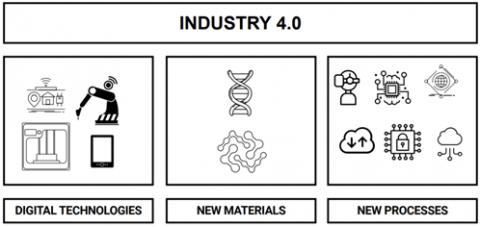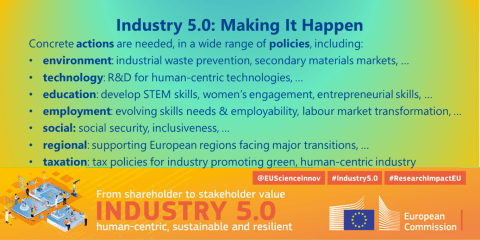E-workshop recording: Industry 4.0
On Wednesday 3 November 2021 from 14:00 to 17:00 (CET), the Policy Learning Platform organised an online workshop on industry 4.0 infrastructure and deployment. This workshop was part of the online workshop series on Industry 4.0 and the SMEs digital transition. Allowing for networking opportunities during breaks, the event was organised around three distinct sessions: a panel discussion with keynote speakers, learning from practices, and thematic working groups.
Industry 4.0 implies the adoption in the industrial sector of technologies that have emerged and diffused in recent years (see Figure 1). It ranges from a variety of digital technologies such as 3D printing, the Internet of Things (IoT), and advanced robotics, to new materials such as bio- or nano-based, to new processes such as data-driven production, cybersecurity, artificial intelligence (AI) and synthetic biology (OECD, 2017)

Figure 1. Industry 4.0 involves Digital Technologies, New Materials and Processes. Source: Industry 4.0 policy brief
Recording
Webinar agenda overview
Navigate to the discussion topics of interest in the webinar agenda overview below.
Moderation and concept by: Arnault Morisson and Marc Pattinson, Thematic Experts of research and innovation.
-
by Arnault Morisson and Elena Ferrario on the topic and the Policy Learning Platform servicesDocument
-
by Martin Huemer, DG Research and Innovation, European CommissionDocument
-
by Pierre-Alexandre Balland, Assistant Professor, Utrecht UniversityDocument
-
by Dominic Gorecky, Director, Swiss Smart Factory (DIGITAL REGIONS)Document
-
by Ger van den Kerkhof, Flanders Make (SMARTY)Document
- Jorge Muyo, Regional Government of Cantabria, Cantabria, Spain (DEVISE/DIGITAL REGIONS)
- Špela Sečnik, Regional Development Agency Posavje, Slovenia (INNO INDUSTRY)
This workshop explored the importance of regional policies to foster industry 4.0 infrastructures and the diffusion of Industry 4.0 technologies for SMEs. Industry 4.0 offers SMEs the opportunity to boost their productivity and competitiveness through implementing highly efficient and automated manufacturing processes allowing for both mass-production and mass-customisation. As a result, regional policies must aim to reduce obstacles for SMEs to the uptake of industry 4.0 technologies with place-sensitive and SME-specific technological solutions.
Martin Huemer from the Directorate-General for Research and Innovation of the European Commission presented the emerging concept of Industry 5.0. Digitalisation and digital technologies are transforming European industries and the role of workers. Industry 4.0 offers many opportunities for workers such as reducing dangerous and routine tasks but also new challenges such as the fear of automation and the reduced wellbeing of the worker. Industry 5.0 has three core pillars, namely, to be sustainable, resilient, and human-centric. Aligned with the European Green Deal, Industry 5.0 is a solution provider for people and the planet.

Pierre-Alexandre Balland from Utrecht University, the Netherlands, presented a tool—investment recommender system—to assess regional opportunities for promoting Industry 4.0 from his article on mapping the potentials of regions in Europe to contribute to new knowledge production in Industry 4.0 technologies. Regions that will embrace Industry 4.0 technologies will have an important comparative advantage as Industry 4.0 technologies are highly tradable, diffuse rapidly, and are highly concentrated geographically. The tool based on economic relatedness provides an evidence-based approach for regional policymakers to prioritise funding in Industry 4.0 technologies that are the most likely to emerge due to their regional economic structures.
Some key insights from the workshop
- Industry 5.0 broadens the scope of Industry 4.0 and shifts the perspective beyond the technological lens to also include sustainable, resilient, and human-centric perspectives. Industry 5.0 is a framework to compensate for inequalities generated by Industry 4.0 technologies. However, for many SMEs that are still struggling with adopting Industry 4.0 technologies, the uptake of the concept of Industry 5.0 might be problematic.
Open platforms can be tools to promote the adoption of Industry 4.0 technologies through collaboration. In DIGITAL REGIONS, the
in Biel/Bienne, Switzerland, created the Open Platform for the Adoption of Digital Innovation to support the exchange of knowledge and best-practices for the adoption of digital technologies for SMEs. The open platform is coordinated by a third-party (non-profit organisation) that provides supports such as services for demonstration, prototyping, testing, networking opportunities, sharing best practices, sharing methodologies for helping SMEs to adopt digital technologies.
- Mobile lab infrastructures can support the adoption of Industry 4.0 technologies. In SMARTY, Flanders Make, Belgium, has created the Flanders Make Lab which is a mobile lab on a trailer to visit operators in SMEs to test and experience Industry 4.0 technologies such as collaborative robotics, artificial intelligence, Internet of Things (IoTs)…
Policy Learning Platform activities
- Regions that are interested to learn from peers to design policies to diffuse industry 4.0 technologies or creating supportive R&D infrastructures can consider applying for a peer review from the Policy Learning Platform.
- The Policy Learning Platform offers an on-demand expert support through the Policy Helpdesk. Please do not hesitate to reach out to us if you have further questions regarding industry 4.0.
- Please do not hesitate to contact the Policy Learning Platform to share ideas for policy briefs, stories, topics for online discussions and online workshops.
- Other useful materials
Several follow-up activities were discussed with the participants:
- Policy brief on
Document
- Article on Diffusing Industry 4.0 technologies in SMEs
- Article on Interreg Europe Projects Contributing to Industry 4.0 Modernisation
- European Commission report on Industry 5.0
- European Commission report on Enabling Technologies for Industry 5.0